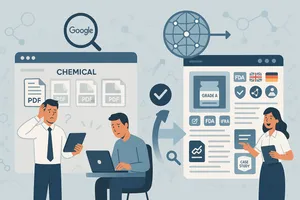SEO Strategy in 2026: A Complete Guide
6 mins | 17 Feb 2026

Table of Contents
1. Introduction
2. Understanding Search Engine Optimization
3. Top 10 strategies to improve the SEO ranking for 2026
4. Conclusion
Introduction
Imagine having the best product or service, but your website is hidden on page 10 of search results. Many businesses face this reality when their SEO strategy becomes outdated.
Your website is like a treasure chest, waiting to be discovered in the vast ocean of the internet. Today, businesses understand that being easily found on search engines like Google is crucial. These are where the uses of SEO play a vital role.
In 2023, the impact of an effective SEO strategy on businesses is enormous. It's not just about ranking higher on Google; it's about being there for your audience when they need you the most. A well-executed SEO strategy turns your website into a magnet, attracting potential customers.
In the following sections, we'll explore the strategies and techniques you need to thrive in this dynamic digital world.
Understanding Search Engine Optimization
Search engines act like internet gatekeepers. They sift through countless websites and present the most relevant ones when someone searches. Search engine work on this mentions SEO Strategy.
I. Relevance
Your content should match what users search for. Think of it as the words users type into search engines.
II. Quality Content
It's not just about keywords; your content must be valuable, informative, and engaging. Quality content keeps users interested.
III. User Experience
A user-friendly website is key. Fast loading, mobile-friendliness, and easy navigation matter for a great user experience.
IV. Authority
Search engines trust authoritative websites. Building backlinks from reputable sources and being a leader in your industry are vital.
V. Technical Optimization
Under the hood, your website should be well-prepared for search engines. This includes meta tags, sitemaps, and structured data.
Read more- What is Performance Marketing
Top 10 strategies to improve the SEO ranking for 2024
Let’s dive deeper into creating effective SEO strategies and exploring how to improve your website's search engine ranking.
1. Setting Clear SEO Goals and Objectives
Think of a specific SEO Strategy as your online destination. They're like the GPS for your online journey, helping you figure out where you want to go on the internet. These goals can be things like improving your website's visibility, getting more people to visit, making your website show up when people search for certain words (keyword rankings), or convincing more visitors to become customers (conversion rates). Having a clear plan for these SEO goals keeps you moving in the right direction and feeling motivated.
But having goals is only part of the story. You also need a way to check if you're getting closer to those goals. Think of KPIs as road signs on your SEO journey, showing you how far you've travelled and how far you still have to go.
For example, suppose your business wants to introduce a new product. In that case, your SEO goals involve:
- Making sure people can easily find information about that product.
- Using the right words in your content (keyword optimization).
- Creating excitement around the launch.
This way, your SEO efforts become a valuable tool for your website's success.
Read more- SEO vs. SEM
2. Conducting Comprehensive Keyword Research
Keyword research has come a long way; it's like delving into the thoughts of your target audience. Understanding what keywords they use and why they use them is key. This shift is driven by search engines getting smarter at understanding context.
Here's what you need for your keyword research. Think of what is the target of SEO keywords and the uses of SEO Strategy.
I. Keyword Research Tools
These specialized tools, like Google Keyword Planner, SEMrush, and Ahrefs, can help you find keywords related to your area of interest.
II. Competitor Analysis
Look at what keywords your competitors are going after. You might discover valuable keyword opportunities.
III. Customer Surveys and Feedback
Sometimes, your audience has the best keywords. Just ask them what words they use to find your products or services.
IV. Long-Tail Keywords
Don't ignore long-tail keywords – they're longer and more specific phrases that can bring in high-quality traffic.
V. Google's Autocomplete
When you start typing in Google, it suggests phrases. These can be great for keyword ideas.
But it's not about finding keywords; it's about understanding the people behind those keywords. What are they really looking for when they type those words into a search engine? This is where user intent roles come into play.
- Informational Intent
People want answers, how-tos, or explanations. Your content should provide valuable information.
- Navigational Intent
Users seeking a specific website or page. Make sure your site structure and content make navigation a breeze.
- Transactional Intent
Some are ready to buy. Ensure your product pages and checkout process are smooth.
- Commercial Investigation Intent
Others are researching but have yet to be ready to purchase. Content like reviews and comparisons can serve this intent.
By aligning your content and SEO with user intent, you create a more user-focused experience. When users find what they're after, they're more likely to engage with your site, making your online journey a success.
3. On-Page SEO Optimization
Imagine your website as a well-organized library; everything should be in its place. A tidy website structure and easy-to-use navigation aren't for visitors – search engines adore them, too. Here's how to make these elements work with SEO Strategy:
I. Meta Titles and Descriptions
Craft appealing meta titles and descriptions with keywords to entice users to click on your search results.
II. Header Tags
Structure your content with the right header tags. H1 is for the main topic, while H2 and H3 are for subsections.
III. Keyword Placement
Include keywords in meta titles, meta descriptions, and image alt text, but keep it natural.
IV. Internal Linking
Link to other relevant pages within your website to help users and boost your site's SEO.
V. Sitemap
Create a sitemap (like a roadmap) for your website and share it with search engines.
VI. User-Friendly URLs
Keep your web addresses short and descriptive. Stop using long numbers or symbols in URLs.
By getting your website structure right, creating great content, and paying attention to SEO details, you're setting the stage for a website that not only ranks well but also gives users an excellent experience.
Read more- Technical SEO Tips
4. Technical SEO Best Practices
Think of technical SEO as the engine running your website. It's the part that ensures search engines like Google can understand your website.
I. Speed Matters
Nobody likes waiting, especially online. If your website takes forever to load, people might leave before seeing your content. Search engines also notice this and might not rank your site high. So, make your site load quickly on both computers and mobile phones.
II. Mobile-Friendly is a Must
Many folks browse the web on mobile phones. So, having a website that works well on mobile is crucial. If it looks weird or doesn't work on a small screen, you might lose visitors. Search engines, like Google, now care about how your site performs on mobile devices.
III. Schema Markup and Structured Data
This is technical but really useful. Think of schema markup and structured data as a secret language that helps search engines understand your content better.
Using structured data helps search engines and gives users more info in the search results. People who see useful details are more likely to click on your site.
Read more- Advanced Technical SEO: A Complete Guide
5. Off-Page SEO and Local SEO Strategies for 2024
Think of off-page SEO as the part where you build your online reputation. It's all about what happens outside your website that can boost your authority and credibility.
I. Ethical Link-Building
Think of links from other websites to yours as votes of confidence. They show that others find your content valuable and trustworthy. But not all links are the same. Ethical link-building means getting high-quality, relevant links from reputable sources.
II. Using Social Media
Social media isn't just a way to connect with your audience; it's also a powerful tool for off-page SEO. When people share your content on social media, it can reach a bigger audience, potentially leading to more links and increased visibility.
Read More- How use ChatGPT for SEO
Local SEO is more vital than ever, with people relying on their smartphones to discover nearby things, being at the top of local search results.
Google My Business It's often the first thing people see when they search for businesses like yours. Optimizing this listing is like ensuring your store's sign is bright and inviting. Fill in all the details, upload photos, and keep your business hours current. This helps you appear in local searches and builds trust with potential customers.
Online reviews are today's equivalent of word-of-mouth recommendations. Encourage happy customers to leave positive reviews and handle negative ones gracefully. This enhances your reputation and shows potential customers that you value their experience.
6. Content Marketing and SEO Integration
In this section, let's dive into how content marketing and SEO work together. They're like a powerful duo, teaming up to enhance your SEO projects.
I. How Content Marketing Enhances SEO
Content marketing involves crafting valuable, informative, and engaging content that your audience loves. Search engines will prize high-quality content more than ever. When you produce content people enjoy and find useful, they're more likely to stay on your site and share it. This indirectly benefits your SEO because search engines take notice when users engage with your site.
II. Developing a Content Strategy Aligned with SEO Goals
Your content strategy should sync with your SEO services, much like plotting a route on a map. Choose keywords that relate to your website and create content around them. This increases your chances of ranking for those keywords and ensures your content serves a purpose.
III. Using Content to Earn Backlinks and Authority
Exceptional content can naturally attract backlinks from other websites. When authoritative sites link to yours, it elevates your credibility and authority in the eyes of search engines. Authorizing backlinks can have an impact on search engine crawlers. So, create content that others want to link to and share within their networks.
By improving local SEO and integrating content marketing into your SEO strategy, you can understand how to do SEO for websites.
Read more- AI tools for SEO
7. Staying Up-to-Date with Algorithm Changes
SEO is like a constantly flowing river. Search engines are always refining their algorithms to provide better results to users. It's vital to understand that what is the target of SEO today might not work tomorrow.
Algorithms can change, and your SEO strategies must adapt accordingly. To stay ahead in the SEO projects, you need to stay informed:
I. Follow Industry News
Subscribe to SEO news websites and blogs to stay updated on the latest algorithm changes and trends.
II. Google's Official Updates
Google often announces significant updates. Keep an eye on their official channels and statements.
III. SEO Communities
Join SEO communities and forums where experts and practitioners discuss algorithm changes and share insights.
IV. Continuous Learning
Invest in your SEO education. Take courses and attend webinars to stay current with the latest techniques.
By staying informed and adaptable, you can navigate the ever-changing SEO landscape and keep your website's visibility strong in search results.
Read more- A Complete Guide On Local SEO
8. International and Multilingual SEO
Expanding your online presence worldwide is an important step in reaching wider audiences. International and multilingual SEO strategies are your keys to achieving this goal.
I. Expanding Your Reach
The internet knows no borders, and your SEO shouldn't either. International SEO allows you to optimize your website to attract visitors from different countries. It shows the process of creating something new in SEO.
II. Optimizing for Global Audiences
When targeting international audiences, it's essential to understand their preferences and needs. Research the keywords and phrases they use, and create content that resonates with them culturally.
This is what complete SEO services mean in one word. how to make a search engine find your website. Expanding your online presence is the best step for making your website SEO-friendly and trustworthy.
9. SEO for E-commerce and Mobile
In 2026, if you're running an online store, you must pay attention to the importance of making your website mobile-friendly. E-commerce and mobile devices are like two peas in a pod.
I. E-commerce SEO
This is all about making sure that when people search for products you sell, your online store shows up in their search results. To make this happen, you need to optimize your product pages. It would be best if you also made your website easy to navigate and manage important information like product reviews and prices.
II. Mobile Optimization
More and more people are using smartphones for shopping and browsing. So, it's crucial to ensure that your website works smoothly on these devices. This means making it mobile-responsive. It also means ensuring it loads quickly on mobile phones and providing a hassle-free shopping experience. Google really likes websites that are mobile-friendly. It often ranks them higher in search results.
Read more- Top SEO strategies to follow in 2023
10. Ethical and Sustainable SEO Practices
SEO isn't just about reaching the top of search results; it's also about doing it responsibly. In 2026, search engines highly value websites that follow the rules and prioritise the user experience. Ethical and sustainable SEO practices align with these principles. Avoiding Black-Hat SEO Techniques:
While black-hat SEO techniques may promise quick results, they often lead to penalties from search engines. These techniques, such as keyword stuffing, cloaking, and buying backlinks, might offer short-term gains, but they can seriously harm your website's long-term credibility.
Instead, ethical SEO practices involve:
- Creating valuable strategies for SEO content.
- Optimizing your website for performance and accessibility.
- Adhering to search engine guidelines.
These practices ensure that your SEO efforts contribute positively to the digital ecosystem.
Conclusion
In this comprehensive guide, we've explored the ever-evolving world of SEO strategies in 2026. From understanding the core principles of SEO to staying up-to-date with algorithm changes, expanding your reach with international SEO, optimizing for e-commerce and mobile, and embracing ethical practices, you've gained valuable insights into crafting effective SEO strategies.
As we conclude, remember that SEO is a dynamic field. To succeed in 2026 and beyond, adaptability and continuous learning are your best allies. Stay curious, keep optimizing, and never stop refining your SEO strategies to ensure your online presence thrives.
Author





_desktop_list_webp_488ed91b.webp)








